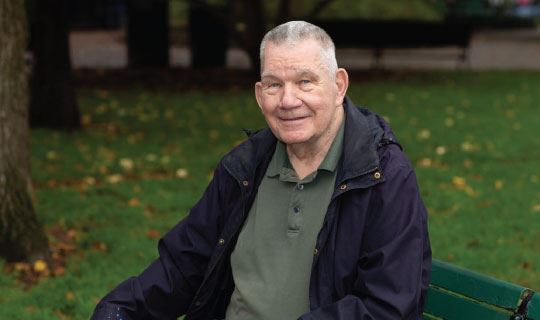"The next day, I walked out of the hospital."

A minimally-invasive surgery was the answer for a Jersey City man with severe aortic stenosis.
Neil Granger, 74, of Jersey City, had known for more than 10 years that he had a heart problem. It was discovered in 2007 when an echocardiogram showed that the gate-like valve in Neil’s aorta—the large blood vessel that carries blood from the heart to the rest of the body—had narrowed.
The condition, known as aortic stenosis, hinders the body’s blood supply. Yet Neil’s condition was mild and symptom free, so no treatment beyond regular checks of the valve was performed. Over the years, echocardiogram results and a continued lack of symptoms indicated that keeping tabs on the valve was appropriate, even as the stenosis advanced from mild to moderate. “That all changed in 2018, though, when my condition went from moderate to severe,” Neil says. Severe aortic stenosis increases risks of complications such as heart failure, blood clots, stroke and abnormal heart rhythm.
“I realized that death could be part of that mix,” Neil recalls. “I thought, ‘I’m old but I’m not that old.’” Neil’s cardiologist, Mary Abed, MD, Chief of Cardiology at Jersey City Medical Center (JCMC) and a member of RWJBarnabas Health medical group, agreed it was time for action. “Historically, the recommendation was open-heart surgery to go in and replace the valve,” Dr. Abed says. Neil resolved to undergo the operation but had to postpone due to a family situation.
A new option
It was a fortuitous twist of fate: During the delay, the Food and Drug Administration (FDA) approved the use of transcatheter aortic valve replacement (TAVR) for patients like Neil. TAVR enables a patient to avoid open-heart surgery—in which an incision is made in the chest to access the heart—in favor of a much less invasive procedure. With TAVR, a replacement valve is installed via a catheter that is inserted in the groin and threaded to the heart through blood vessels.
Previously, TAVR had been approved only for people who were at high risk of serious complications from open-heart surgery and might not be able to survive the operation. “I was considered low-risk for open-heart surgery because I had no other problems heart-wise and still had no symptoms. I had been told I was not qualified for TAVR,” Neil says. “Then lo and behold, I got a call that it was available to me, and I set it up ASAP.”
“Recent clinical research has shown that patients at low surgical risk who had TAVR did equally as well as those who received open-heart surgery, and in some cases did better,” Dr. Abed explains. The minimally invasive surgery offers reduced risk of excessive blood loss and also avoids the risks of being on a respirator, thereby allowing the patient to go home faster.
“The hospital stay has gone from a week to sometimes just a day,” Dr. Abed says. “That’s really quite remarkable.” TAVR patients get back to work soon. Dr. Abed cites the example of Rolling Stones front man Mick Jagger, who underwent TAVR surgery in April 2019 and was back on stage performing by June.
Less than three weeks after the FDA approval, Neil had his TAVR procedure done at Newark Beth Israel Medical Center, another facility within the RWJBarnabas Health system.
“The next day, I walked out of the hospital,” he says. Having his surgeon and cardiologist within the same system allows Neil to have seamless continuity of care. “He follows up with his surgeon and then comes back to me, his regular cardiologist,” Dr. Abed says.
Follow-up is convenient for Neil, who lives within walking distance of JCMC. But if he needs further consultations at Newark Beth Israel, shuttle services are available to provide transportation between facilities. Neil is counting his blessings for squeaking under the wire with TAVR’s approval for low-risk patients. “I lucked out,” he says.
Healthy eating:
Recipe: Heartwarming black lentil soup
Your heart doesn't just beat for you. Get it checked. To reach a Jersey City Medical Center cardiac specialist, call: 888.724.7123 or visit the TAVR Screening Clinic to learn more.
